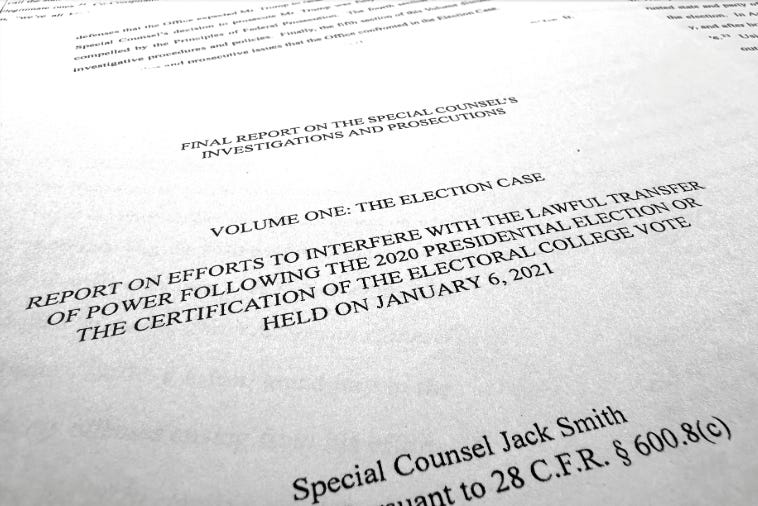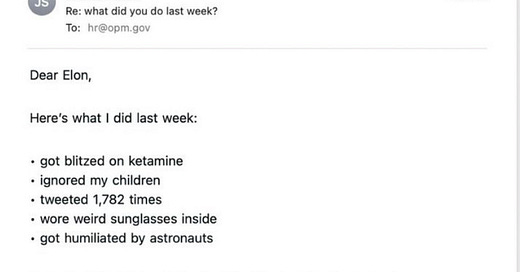
We are crowd-sourcing volume one (The Election Case) of the “Final Report on the Special Counsel’s Investigations and Prosecutions.”
Here is where we get into the nitty-gritty of Trump’s actions as the insurrection was at play. He watched the news coverage, ignored advisers who told him to do something to quell the crowds, and even tweeted an encouragement to them:
"Mike Pence didn't have the courage to do what should have been done to protect our Country and our Constitution, giving States a chance to certify a corrected set of facts, not the fraudulent or inaccurate ones which they were asked to previously certify. USA demands the truth!"
The truth was that Trump had lost, and this was his last-gasp effort to stay in power. Secret Service agents moved the vice president to a secure location, and when an aide told Trump this, he said, “So what?”
Ah, leadership.
Trump kept tweeting encouragement to the crowds, until 6:01 p.m., when he told the crowds to go home and “remember this day forever!” He then tried some more palace intrigue, but once the insurrectionists had been cleared away, Pence presided over the certification of the electoral votes, and the country had a newer, saner president.
A grand jury found Trump found plausible cause to indict Trump on:
Conspiring to obstruct the governmental function of selecting and certifying the President of the United States, in violation of 18 U.S.C. § 371
Obstructing and attempting to obstruct the official proceeding on January 6, 2021, in violation of 18 U.S.C. § 1512(c)(2)
Conspiring to obstruct the official proceeding, in violation of 18 U.S.C. § 1512(k); and
Conspiring to violate the federal rights of citizens to vote and have their votes counted, in violation of 18 U.S.C. § 241.
These are serious charges. SCOTUS ruled that the king Trump had absolute immunity for core presidential conduct, “rebuttable presumption of immunity for other official presidential acts, and had no immunity for unofficial conduct.”
And so the charges had to be reexamined, and the office found that he’d still broken the law, seriously so.
As for 18 U.S.C. § 371: The defraud clause covers more than just defrauding the U.S. out of money. From Hammerschmidt v. United States, a 1924 SCOTUS case that overturned a lower court’s decision to convict Thomas Hammerschmidt and 12 others who had been encouraging people to resist the draft, Trump had obstructed a lawful function of the government (the election) using deceit and dishonesty. Trump had also taken at least one act (actually, he’d taken many and the report lays that out pretty clearly) to commit such a fraud.
In fact, he’d done so, according to the report, beyond a reasonable doubt. He lied that he won, he perpetuated the lie on social media and in public speeches, and he urged others to participate in the lie.
And all the while, he knew he was lying. But he did it, anyway even while court after court shot down his lie. Even away from the public eye:
In private-in contrast with his public false claims-Mr. Trump made admissions that reflected his understanding that he had lost. In a private moment, Mr. Trump confessed to his family members that "it doesn't matter if you won or lost the election. You still have to fight like hell."
His knowledge that he was willfully lying satisfies what’s called a “mens rea standard,” or “criminal intent.” All this while SCOTUS has narrowed the definition of federal fraud and obstruction statutes, as with Ciminelli v. United States, a 2023 unanimous decision involving a New York construction contractor awarding contracts to his buddies. That is a tragically boiled-down version of the case.
















BTW: Since I'm still on fb for the time being, I am posting these there as you do here.